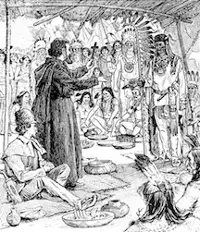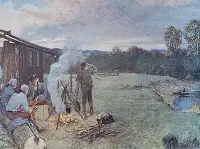Saturday, May 31, 2025
The Making of the 50 States: Arkansas
Part 1: In the Beginning Among the Native American tribes who lived in what is now Arkansas were the Biloxi, Caddo, Cherokee, Quapaw, and Tunica. Their predecessors in the area were part of the Woodland culture and then the Mound Builder culture. One medieval group was known as the Plum Bayou people. Very early settlers were called the Bluff Dwellers. 
In much the same way as in other neighboring states, Arkansas was first visited by a European in the form of Spain's Hernando de Soto, in 1541; visited by French explorers Marquette and Jolliet in 1673; and claimed for France by René-Robert Cavelier, Sieur de La Salle in 1682. Frenchman Henri de Tonti built the first permanent settlement, the Arkansas Post, in 1686. He would become known as the "Father of Arkansas." What is now Arkansas was part of the vast Louisiana Territory, which was owned by France until 1762, when ownership transferred to Spain. The population increased as the enticement of new land to farm and claim proved irresistible to a growing number of settlers coming from the east. A series of land grants issued after the War of 1812 spurred immigration. An early preference for fur trading gave way to other farming pursuits. Cotton eventually became a big crop in the state, as the beginnings of a plantation society emerged. Arkansas Post was the site of a few important events in early Arkansas history:

Next page > The Rest of the Story > Page 1, 2 |
|
Social Studies for Kids
copyright 2002–2024
David White




